Human Resource Management in Hospitality Industry Report
VerifiedAdded on 2022/12/27
|18
|5073
|2
Report
AI Summary
This report delves into the multifaceted realm of Human Resource Management (HRM) within the hospitality industry. It begins by identifying contemporary issues and emerging trends, such as managing diverse workforces, addressing high employee turnover, and navigating compliance with evolving laws and regulations. The report then provides detailed job descriptions and person specifications for an HR manager and a finance manager, highlighting their responsibilities, required skills, and qualifications. Furthermore, it examines the process of performance management within the hospitality sector, emphasizing its role in minimizing staff turnover and identifying training needs. The report also includes an evaluation of specific HR policies and practices within the context of Holiday Inn, providing insights into their effectiveness. Overall, the report offers a comprehensive overview of HRM in the hospitality industry, addressing key challenges and providing practical solutions.
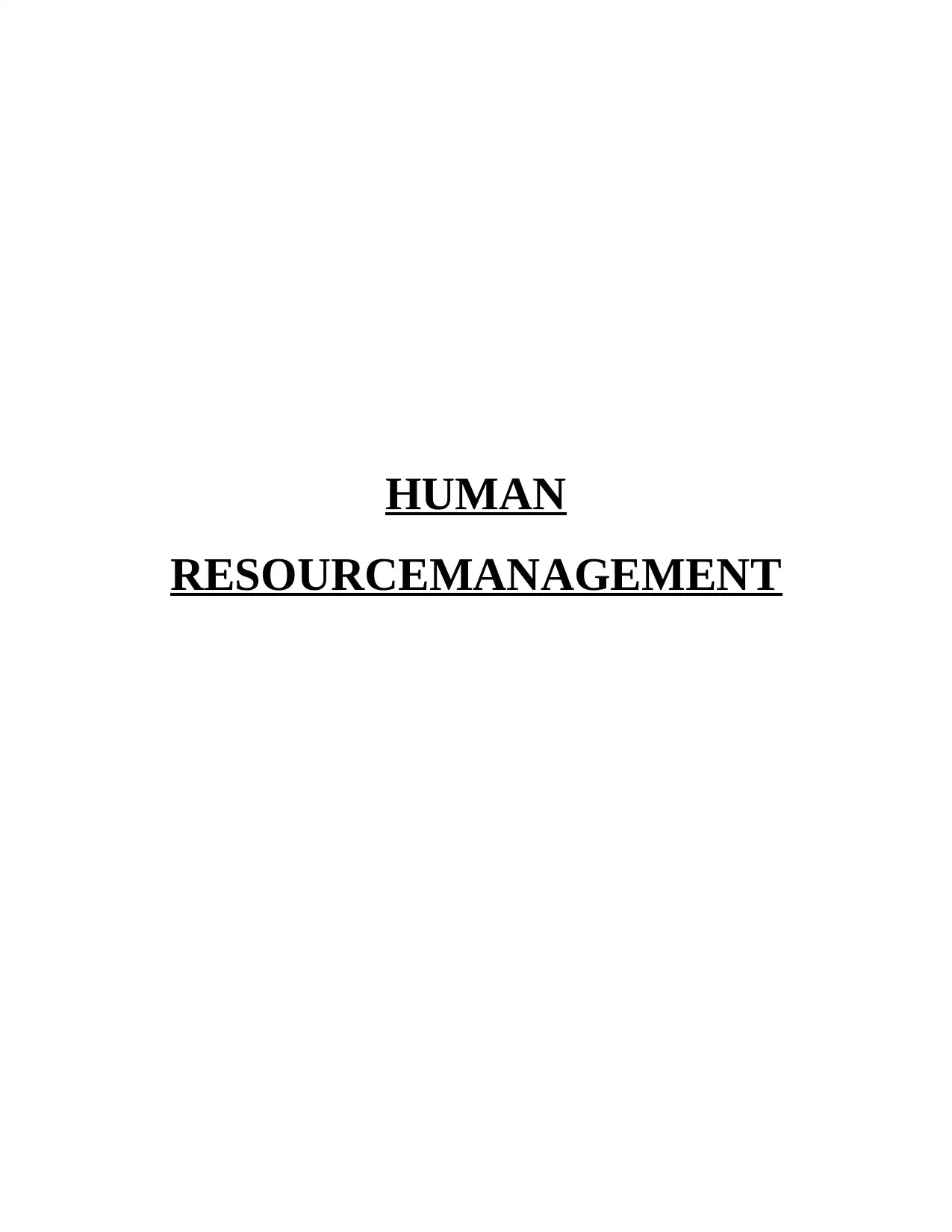
HUMAN
RESOURCEMANAGEMENT
RESOURCEMANAGEMENT
Paraphrase This Document
Need a fresh take? Get an instant paraphrase of this document with our AI Paraphraser
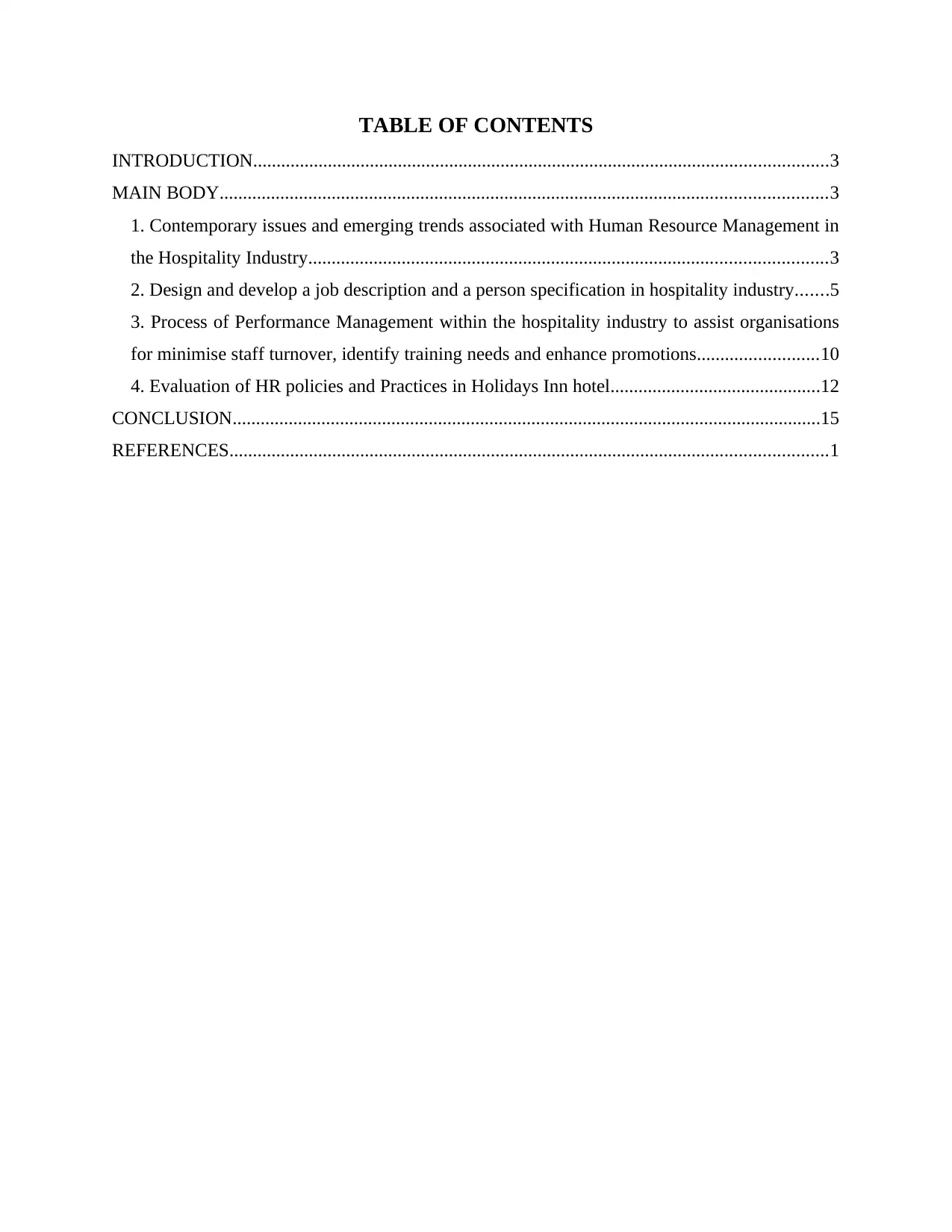
TABLE OF CONTENTS
INTRODUCTION...........................................................................................................................3
MAIN BODY..................................................................................................................................3
1. Contemporary issues and emerging trends associated with Human Resource Management in
the Hospitality Industry...............................................................................................................3
2. Design and develop a job description and a person specification in hospitality industry.......5
3. Process of Performance Management within the hospitality industry to assist organisations
for minimise staff turnover, identify training needs and enhance promotions..........................10
4. Evaluation of HR policies and Practices in Holidays Inn hotel.............................................12
CONCLUSION..............................................................................................................................15
REFERENCES................................................................................................................................1
INTRODUCTION...........................................................................................................................3
MAIN BODY..................................................................................................................................3
1. Contemporary issues and emerging trends associated with Human Resource Management in
the Hospitality Industry...............................................................................................................3
2. Design and develop a job description and a person specification in hospitality industry.......5
3. Process of Performance Management within the hospitality industry to assist organisations
for minimise staff turnover, identify training needs and enhance promotions..........................10
4. Evaluation of HR policies and Practices in Holidays Inn hotel.............................................12
CONCLUSION..............................................................................................................................15
REFERENCES................................................................................................................................1
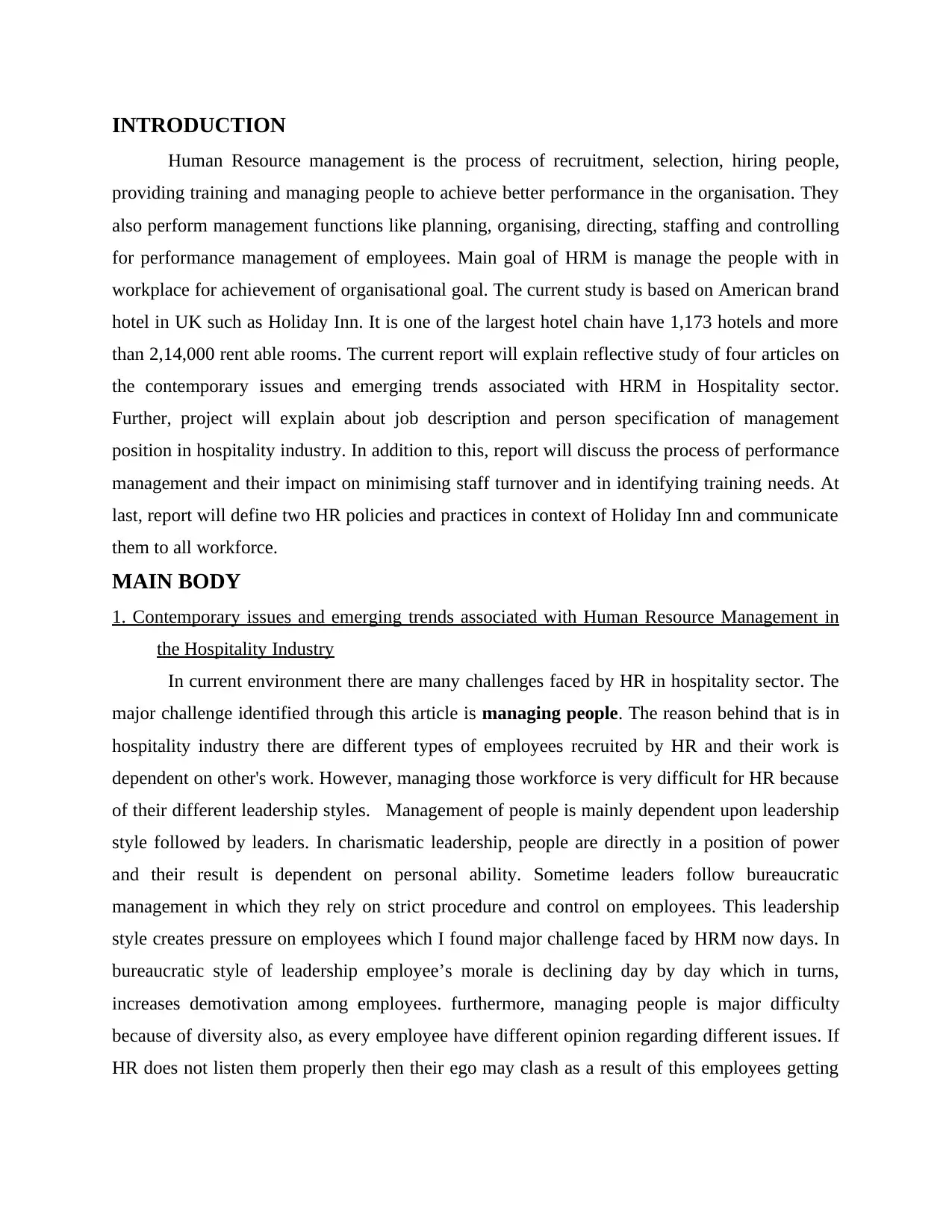
INTRODUCTION
Human Resource management is the process of recruitment, selection, hiring people,
providing training and managing people to achieve better performance in the organisation. They
also perform management functions like planning, organising, directing, staffing and controlling
for performance management of employees. Main goal of HRM is manage the people with in
workplace for achievement of organisational goal. The current study is based on American brand
hotel in UK such as Holiday Inn. It is one of the largest hotel chain have 1,173 hotels and more
than 2,14,000 rent able rooms. The current report will explain reflective study of four articles on
the contemporary issues and emerging trends associated with HRM in Hospitality sector.
Further, project will explain about job description and person specification of management
position in hospitality industry. In addition to this, report will discuss the process of performance
management and their impact on minimising staff turnover and in identifying training needs. At
last, report will define two HR policies and practices in context of Holiday Inn and communicate
them to all workforce.
MAIN BODY
1. Contemporary issues and emerging trends associated with Human Resource Management in
the Hospitality Industry
In current environment there are many challenges faced by HR in hospitality sector. The
major challenge identified through this article is managing people. The reason behind that is in
hospitality industry there are different types of employees recruited by HR and their work is
dependent on other's work. However, managing those workforce is very difficult for HR because
of their different leadership styles. Management of people is mainly dependent upon leadership
style followed by leaders. In charismatic leadership, people are directly in a position of power
and their result is dependent on personal ability. Sometime leaders follow bureaucratic
management in which they rely on strict procedure and control on employees. This leadership
style creates pressure on employees which I found major challenge faced by HRM now days. In
bureaucratic style of leadership employee’s morale is declining day by day which in turns,
increases demotivation among employees. furthermore, managing people is major difficulty
because of diversity also, as every employee have different opinion regarding different issues. If
HR does not listen them properly then their ego may clash as a result of this employees getting
Human Resource management is the process of recruitment, selection, hiring people,
providing training and managing people to achieve better performance in the organisation. They
also perform management functions like planning, organising, directing, staffing and controlling
for performance management of employees. Main goal of HRM is manage the people with in
workplace for achievement of organisational goal. The current study is based on American brand
hotel in UK such as Holiday Inn. It is one of the largest hotel chain have 1,173 hotels and more
than 2,14,000 rent able rooms. The current report will explain reflective study of four articles on
the contemporary issues and emerging trends associated with HRM in Hospitality sector.
Further, project will explain about job description and person specification of management
position in hospitality industry. In addition to this, report will discuss the process of performance
management and their impact on minimising staff turnover and in identifying training needs. At
last, report will define two HR policies and practices in context of Holiday Inn and communicate
them to all workforce.
MAIN BODY
1. Contemporary issues and emerging trends associated with Human Resource Management in
the Hospitality Industry
In current environment there are many challenges faced by HR in hospitality sector. The
major challenge identified through this article is managing people. The reason behind that is in
hospitality industry there are different types of employees recruited by HR and their work is
dependent on other's work. However, managing those workforce is very difficult for HR because
of their different leadership styles. Management of people is mainly dependent upon leadership
style followed by leaders. In charismatic leadership, people are directly in a position of power
and their result is dependent on personal ability. Sometime leaders follow bureaucratic
management in which they rely on strict procedure and control on employees. This leadership
style creates pressure on employees which I found major challenge faced by HRM now days. In
bureaucratic style of leadership employee’s morale is declining day by day which in turns,
increases demotivation among employees. furthermore, managing people is major difficulty
because of diversity also, as every employee have different opinion regarding different issues. If
HR does not listen them properly then their ego may clash as a result of this employees getting
⊘ This is a preview!⊘
Do you want full access?
Subscribe today to unlock all pages.

Trusted by 1+ million students worldwide
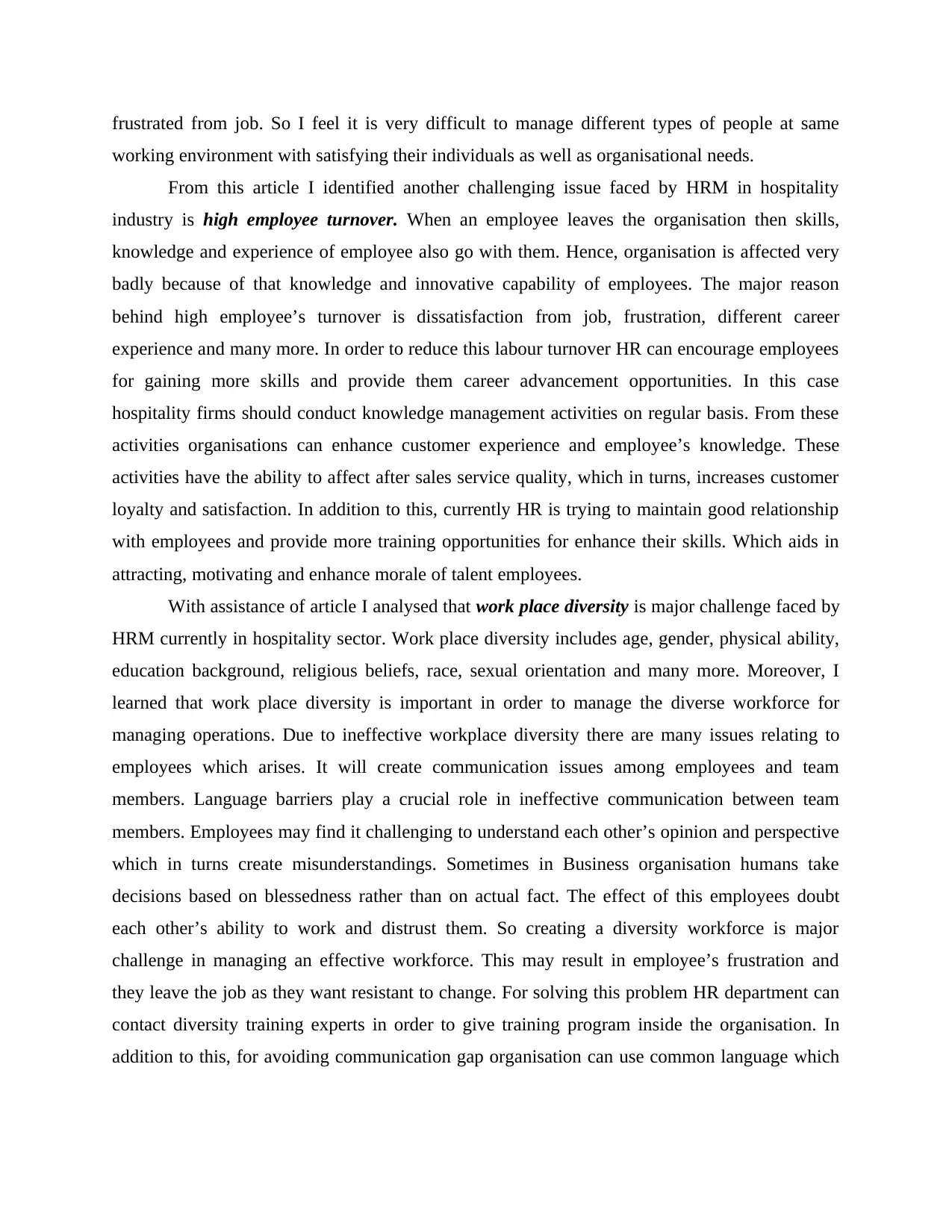
frustrated from job. So I feel it is very difficult to manage different types of people at same
working environment with satisfying their individuals as well as organisational needs.
From this article I identified another challenging issue faced by HRM in hospitality
industry is high employee turnover. When an employee leaves the organisation then skills,
knowledge and experience of employee also go with them. Hence, organisation is affected very
badly because of that knowledge and innovative capability of employees. The major reason
behind high employee’s turnover is dissatisfaction from job, frustration, different career
experience and many more. In order to reduce this labour turnover HR can encourage employees
for gaining more skills and provide them career advancement opportunities. In this case
hospitality firms should conduct knowledge management activities on regular basis. From these
activities organisations can enhance customer experience and employee’s knowledge. These
activities have the ability to affect after sales service quality, which in turns, increases customer
loyalty and satisfaction. In addition to this, currently HR is trying to maintain good relationship
with employees and provide more training opportunities for enhance their skills. Which aids in
attracting, motivating and enhance morale of talent employees.
With assistance of article I analysed that work place diversity is major challenge faced by
HRM currently in hospitality sector. Work place diversity includes age, gender, physical ability,
education background, religious beliefs, race, sexual orientation and many more. Moreover, I
learned that work place diversity is important in order to manage the diverse workforce for
managing operations. Due to ineffective workplace diversity there are many issues relating to
employees which arises. It will create communication issues among employees and team
members. Language barriers play a crucial role in ineffective communication between team
members. Employees may find it challenging to understand each other’s opinion and perspective
which in turns create misunderstandings. Sometimes in Business organisation humans take
decisions based on blessedness rather than on actual fact. The effect of this employees doubt
each other’s ability to work and distrust them. So creating a diversity workforce is major
challenge in managing an effective workforce. This may result in employee’s frustration and
they leave the job as they want resistant to change. For solving this problem HR department can
contact diversity training experts in order to give training program inside the organisation. In
addition to this, for avoiding communication gap organisation can use common language which
working environment with satisfying their individuals as well as organisational needs.
From this article I identified another challenging issue faced by HRM in hospitality
industry is high employee turnover. When an employee leaves the organisation then skills,
knowledge and experience of employee also go with them. Hence, organisation is affected very
badly because of that knowledge and innovative capability of employees. The major reason
behind high employee’s turnover is dissatisfaction from job, frustration, different career
experience and many more. In order to reduce this labour turnover HR can encourage employees
for gaining more skills and provide them career advancement opportunities. In this case
hospitality firms should conduct knowledge management activities on regular basis. From these
activities organisations can enhance customer experience and employee’s knowledge. These
activities have the ability to affect after sales service quality, which in turns, increases customer
loyalty and satisfaction. In addition to this, currently HR is trying to maintain good relationship
with employees and provide more training opportunities for enhance their skills. Which aids in
attracting, motivating and enhance morale of talent employees.
With assistance of article I analysed that work place diversity is major challenge faced by
HRM currently in hospitality sector. Work place diversity includes age, gender, physical ability,
education background, religious beliefs, race, sexual orientation and many more. Moreover, I
learned that work place diversity is important in order to manage the diverse workforce for
managing operations. Due to ineffective workplace diversity there are many issues relating to
employees which arises. It will create communication issues among employees and team
members. Language barriers play a crucial role in ineffective communication between team
members. Employees may find it challenging to understand each other’s opinion and perspective
which in turns create misunderstandings. Sometimes in Business organisation humans take
decisions based on blessedness rather than on actual fact. The effect of this employees doubt
each other’s ability to work and distrust them. So creating a diversity workforce is major
challenge in managing an effective workforce. This may result in employee’s frustration and
they leave the job as they want resistant to change. For solving this problem HR department can
contact diversity training experts in order to give training program inside the organisation. In
addition to this, for avoiding communication gap organisation can use common language which
Paraphrase This Document
Need a fresh take? Get an instant paraphrase of this document with our AI Paraphraser
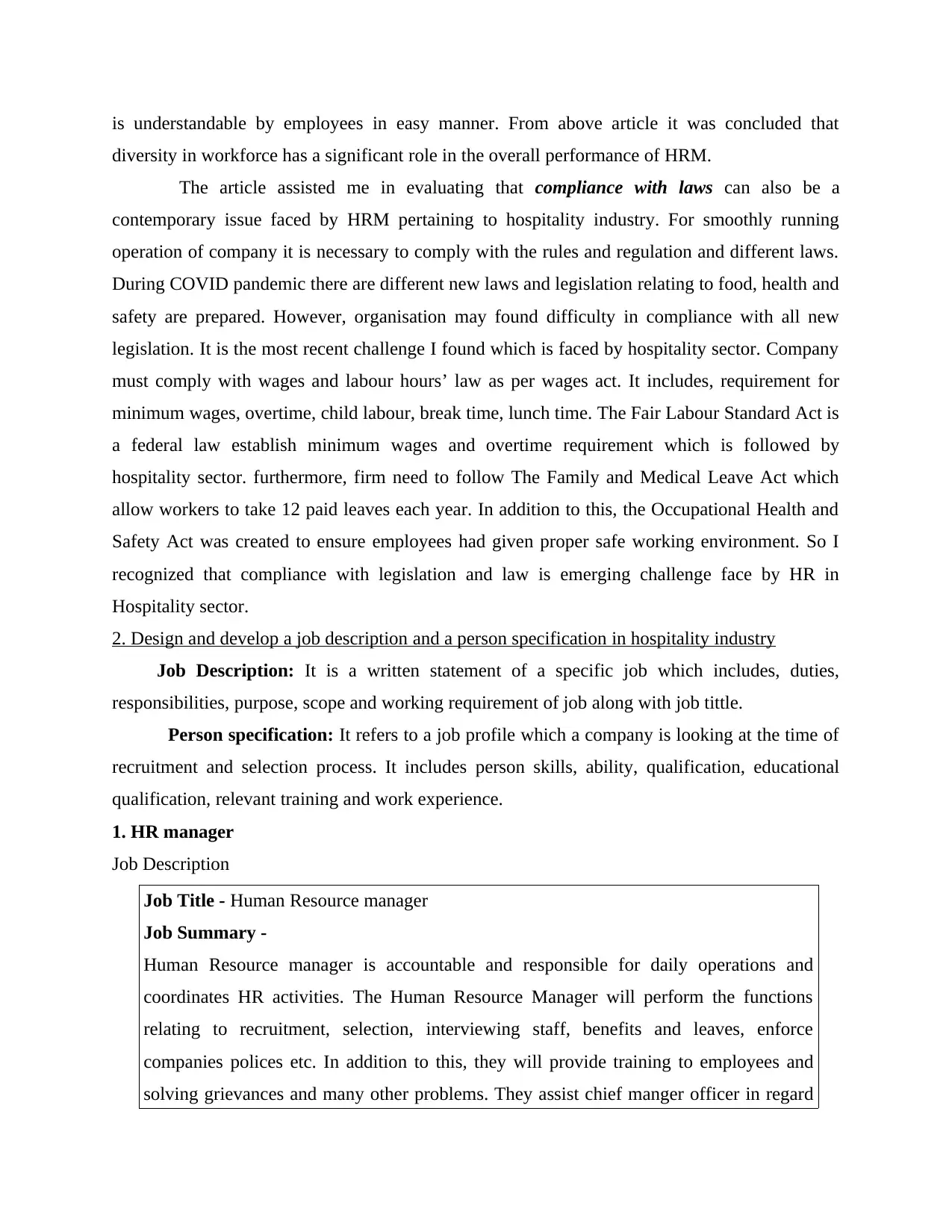
is understandable by employees in easy manner. From above article it was concluded that
diversity in workforce has a significant role in the overall performance of HRM.
The article assisted me in evaluating that compliance with laws can also be a
contemporary issue faced by HRM pertaining to hospitality industry. For smoothly running
operation of company it is necessary to comply with the rules and regulation and different laws.
During COVID pandemic there are different new laws and legislation relating to food, health and
safety are prepared. However, organisation may found difficulty in compliance with all new
legislation. It is the most recent challenge I found which is faced by hospitality sector. Company
must comply with wages and labour hours’ law as per wages act. It includes, requirement for
minimum wages, overtime, child labour, break time, lunch time. The Fair Labour Standard Act is
a federal law establish minimum wages and overtime requirement which is followed by
hospitality sector. furthermore, firm need to follow The Family and Medical Leave Act which
allow workers to take 12 paid leaves each year. In addition to this, the Occupational Health and
Safety Act was created to ensure employees had given proper safe working environment. So I
recognized that compliance with legislation and law is emerging challenge face by HR in
Hospitality sector.
2. Design and develop a job description and a person specification in hospitality industry
Job Description: It is a written statement of a specific job which includes, duties,
responsibilities, purpose, scope and working requirement of job along with job tittle.
Person specification: It refers to a job profile which a company is looking at the time of
recruitment and selection process. It includes person skills, ability, qualification, educational
qualification, relevant training and work experience.
1. HR manager
Job Description
Job Title - Human Resource manager
Job Summary -
Human Resource manager is accountable and responsible for daily operations and
coordinates HR activities. The Human Resource Manager will perform the functions
relating to recruitment, selection, interviewing staff, benefits and leaves, enforce
companies polices etc. In addition to this, they will provide training to employees and
solving grievances and many other problems. They assist chief manger officer in regard
diversity in workforce has a significant role in the overall performance of HRM.
The article assisted me in evaluating that compliance with laws can also be a
contemporary issue faced by HRM pertaining to hospitality industry. For smoothly running
operation of company it is necessary to comply with the rules and regulation and different laws.
During COVID pandemic there are different new laws and legislation relating to food, health and
safety are prepared. However, organisation may found difficulty in compliance with all new
legislation. It is the most recent challenge I found which is faced by hospitality sector. Company
must comply with wages and labour hours’ law as per wages act. It includes, requirement for
minimum wages, overtime, child labour, break time, lunch time. The Fair Labour Standard Act is
a federal law establish minimum wages and overtime requirement which is followed by
hospitality sector. furthermore, firm need to follow The Family and Medical Leave Act which
allow workers to take 12 paid leaves each year. In addition to this, the Occupational Health and
Safety Act was created to ensure employees had given proper safe working environment. So I
recognized that compliance with legislation and law is emerging challenge face by HR in
Hospitality sector.
2. Design and develop a job description and a person specification in hospitality industry
Job Description: It is a written statement of a specific job which includes, duties,
responsibilities, purpose, scope and working requirement of job along with job tittle.
Person specification: It refers to a job profile which a company is looking at the time of
recruitment and selection process. It includes person skills, ability, qualification, educational
qualification, relevant training and work experience.
1. HR manager
Job Description
Job Title - Human Resource manager
Job Summary -
Human Resource manager is accountable and responsible for daily operations and
coordinates HR activities. The Human Resource Manager will perform the functions
relating to recruitment, selection, interviewing staff, benefits and leaves, enforce
companies polices etc. In addition to this, they will provide training to employees and
solving grievances and many other problems. They assist chief manger officer in regard
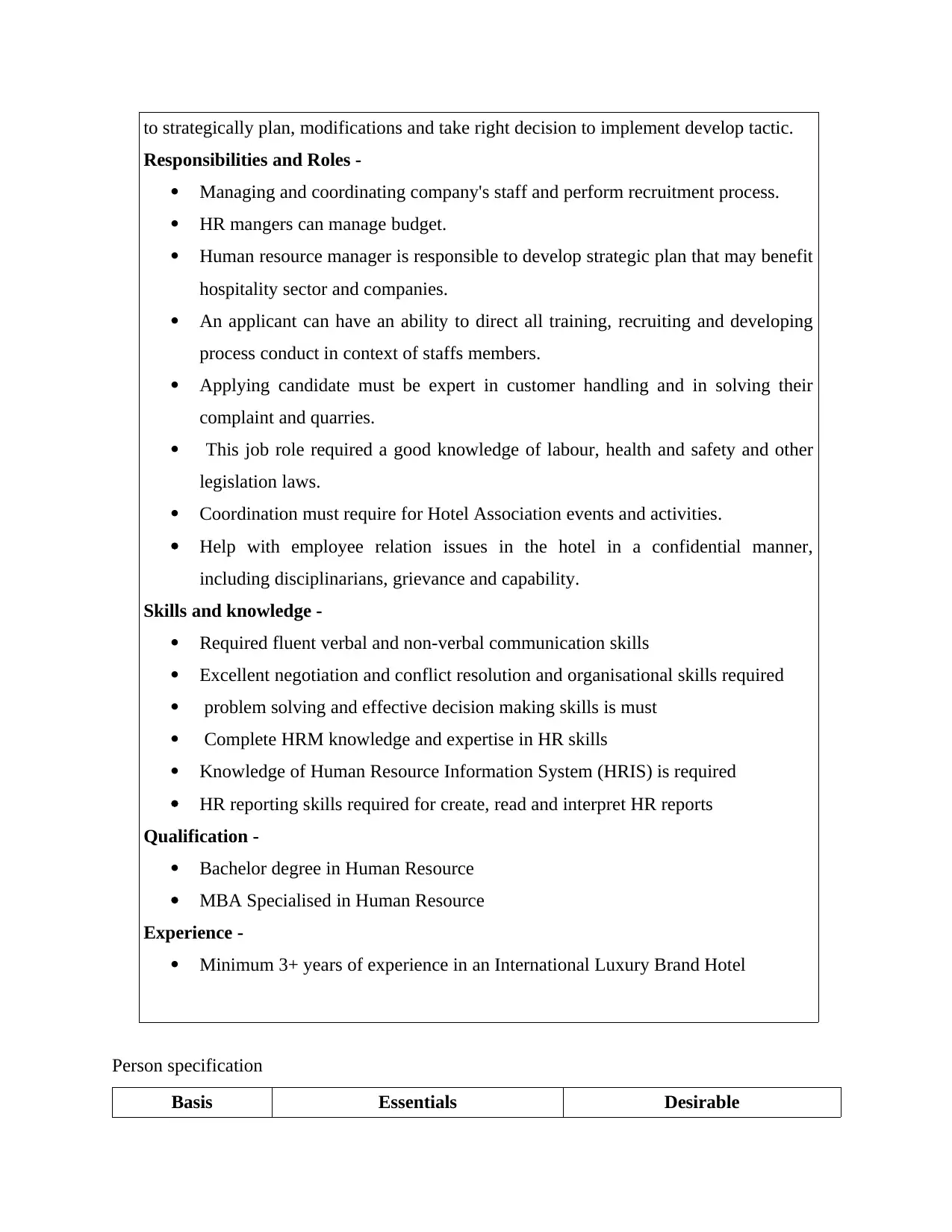
to strategically plan, modifications and take right decision to implement develop tactic.
Responsibilities and Roles -
Managing and coordinating company's staff and perform recruitment process.
HR mangers can manage budget.
Human resource manager is responsible to develop strategic plan that may benefit
hospitality sector and companies.
An applicant can have an ability to direct all training, recruiting and developing
process conduct in context of staffs members.
Applying candidate must be expert in customer handling and in solving their
complaint and quarries.
This job role required a good knowledge of labour, health and safety and other
legislation laws.
Coordination must require for Hotel Association events and activities.
Help with employee relation issues in the hotel in a confidential manner,
including disciplinarians, grievance and capability.
Skills and knowledge -
Required fluent verbal and non-verbal communication skills
Excellent negotiation and conflict resolution and organisational skills required
problem solving and effective decision making skills is must
Complete HRM knowledge and expertise in HR skills
Knowledge of Human Resource Information System (HRIS) is required
HR reporting skills required for create, read and interpret HR reports
Qualification -
Bachelor degree in Human Resource
MBA Specialised in Human Resource
Experience -
Minimum 3+ years of experience in an International Luxury Brand Hotel
Person specification
Basis Essentials Desirable
Responsibilities and Roles -
Managing and coordinating company's staff and perform recruitment process.
HR mangers can manage budget.
Human resource manager is responsible to develop strategic plan that may benefit
hospitality sector and companies.
An applicant can have an ability to direct all training, recruiting and developing
process conduct in context of staffs members.
Applying candidate must be expert in customer handling and in solving their
complaint and quarries.
This job role required a good knowledge of labour, health and safety and other
legislation laws.
Coordination must require for Hotel Association events and activities.
Help with employee relation issues in the hotel in a confidential manner,
including disciplinarians, grievance and capability.
Skills and knowledge -
Required fluent verbal and non-verbal communication skills
Excellent negotiation and conflict resolution and organisational skills required
problem solving and effective decision making skills is must
Complete HRM knowledge and expertise in HR skills
Knowledge of Human Resource Information System (HRIS) is required
HR reporting skills required for create, read and interpret HR reports
Qualification -
Bachelor degree in Human Resource
MBA Specialised in Human Resource
Experience -
Minimum 3+ years of experience in an International Luxury Brand Hotel
Person specification
Basis Essentials Desirable
⊘ This is a preview!⊘
Do you want full access?
Subscribe today to unlock all pages.

Trusted by 1+ million students worldwide
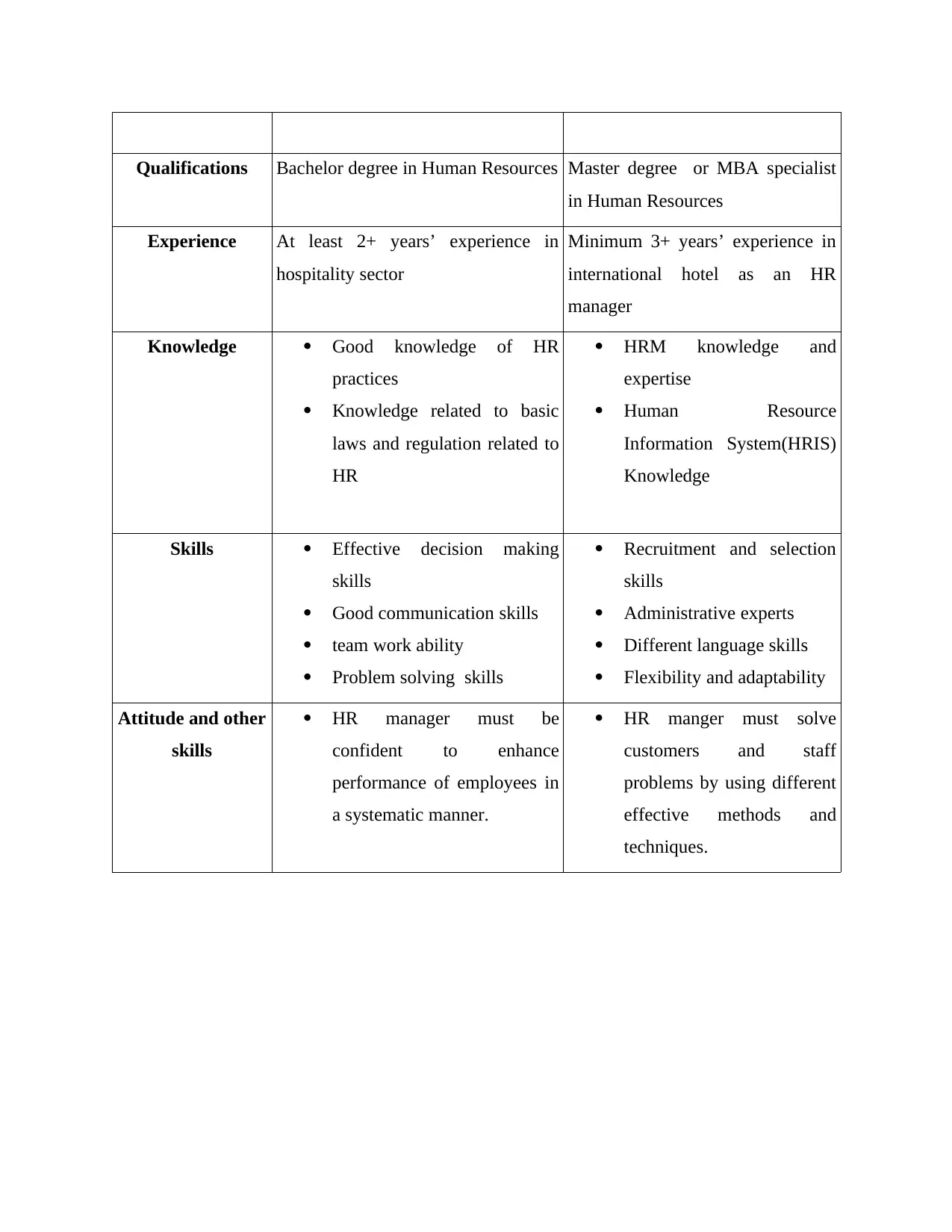
Qualifications Bachelor degree in Human Resources Master degree or MBA specialist
in Human Resources
Experience At least 2+ years’ experience in
hospitality sector
Minimum 3+ years’ experience in
international hotel as an HR
manager
Knowledge Good knowledge of HR
practices
Knowledge related to basic
laws and regulation related to
HR
HRM knowledge and
expertise
Human Resource
Information System(HRIS)
Knowledge
Skills Effective decision making
skills
Good communication skills
team work ability
Problem solving skills
Recruitment and selection
skills
Administrative experts
Different language skills
Flexibility and adaptability
Attitude and other
skills
HR manager must be
confident to enhance
performance of employees in
a systematic manner.
HR manger must solve
customers and staff
problems by using different
effective methods and
techniques.
in Human Resources
Experience At least 2+ years’ experience in
hospitality sector
Minimum 3+ years’ experience in
international hotel as an HR
manager
Knowledge Good knowledge of HR
practices
Knowledge related to basic
laws and regulation related to
HR
HRM knowledge and
expertise
Human Resource
Information System(HRIS)
Knowledge
Skills Effective decision making
skills
Good communication skills
team work ability
Problem solving skills
Recruitment and selection
skills
Administrative experts
Different language skills
Flexibility and adaptability
Attitude and other
skills
HR manager must be
confident to enhance
performance of employees in
a systematic manner.
HR manger must solve
customers and staff
problems by using different
effective methods and
techniques.
Paraphrase This Document
Need a fresh take? Get an instant paraphrase of this document with our AI Paraphraser
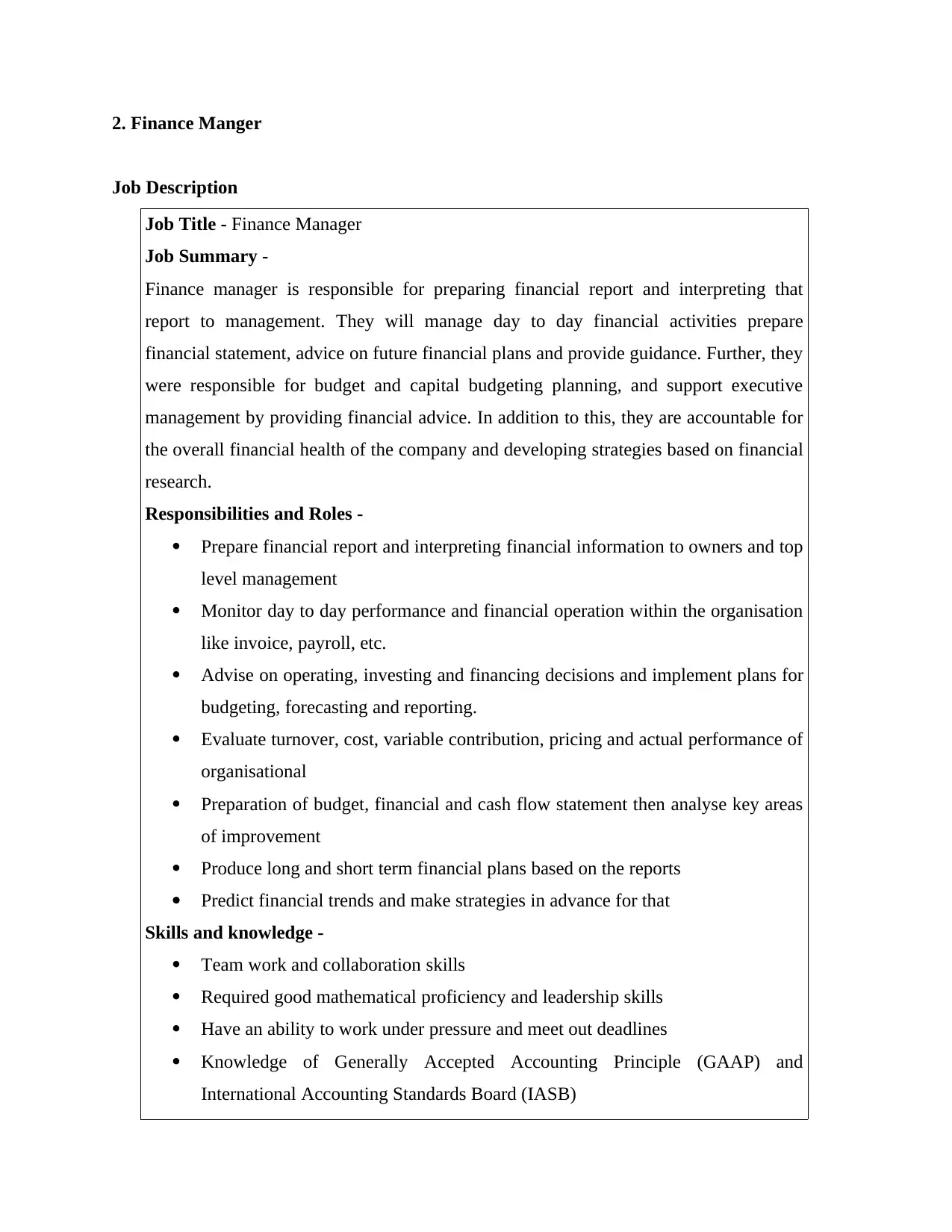
2. Finance Manger
Job Description
Job Title - Finance Manager
Job Summary -
Finance manager is responsible for preparing financial report and interpreting that
report to management. They will manage day to day financial activities prepare
financial statement, advice on future financial plans and provide guidance. Further, they
were responsible for budget and capital budgeting planning, and support executive
management by providing financial advice. In addition to this, they are accountable for
the overall financial health of the company and developing strategies based on financial
research.
Responsibilities and Roles -
Prepare financial report and interpreting financial information to owners and top
level management
Monitor day to day performance and financial operation within the organisation
like invoice, payroll, etc.
Advise on operating, investing and financing decisions and implement plans for
budgeting, forecasting and reporting.
Evaluate turnover, cost, variable contribution, pricing and actual performance of
organisational
Preparation of budget, financial and cash flow statement then analyse key areas
of improvement
Produce long and short term financial plans based on the reports
Predict financial trends and make strategies in advance for that
Skills and knowledge -
Team work and collaboration skills
Required good mathematical proficiency and leadership skills
Have an ability to work under pressure and meet out deadlines
Knowledge of Generally Accepted Accounting Principle (GAAP) and
International Accounting Standards Board (IASB)
Job Description
Job Title - Finance Manager
Job Summary -
Finance manager is responsible for preparing financial report and interpreting that
report to management. They will manage day to day financial activities prepare
financial statement, advice on future financial plans and provide guidance. Further, they
were responsible for budget and capital budgeting planning, and support executive
management by providing financial advice. In addition to this, they are accountable for
the overall financial health of the company and developing strategies based on financial
research.
Responsibilities and Roles -
Prepare financial report and interpreting financial information to owners and top
level management
Monitor day to day performance and financial operation within the organisation
like invoice, payroll, etc.
Advise on operating, investing and financing decisions and implement plans for
budgeting, forecasting and reporting.
Evaluate turnover, cost, variable contribution, pricing and actual performance of
organisational
Preparation of budget, financial and cash flow statement then analyse key areas
of improvement
Produce long and short term financial plans based on the reports
Predict financial trends and make strategies in advance for that
Skills and knowledge -
Team work and collaboration skills
Required good mathematical proficiency and leadership skills
Have an ability to work under pressure and meet out deadlines
Knowledge of Generally Accepted Accounting Principle (GAAP) and
International Accounting Standards Board (IASB)
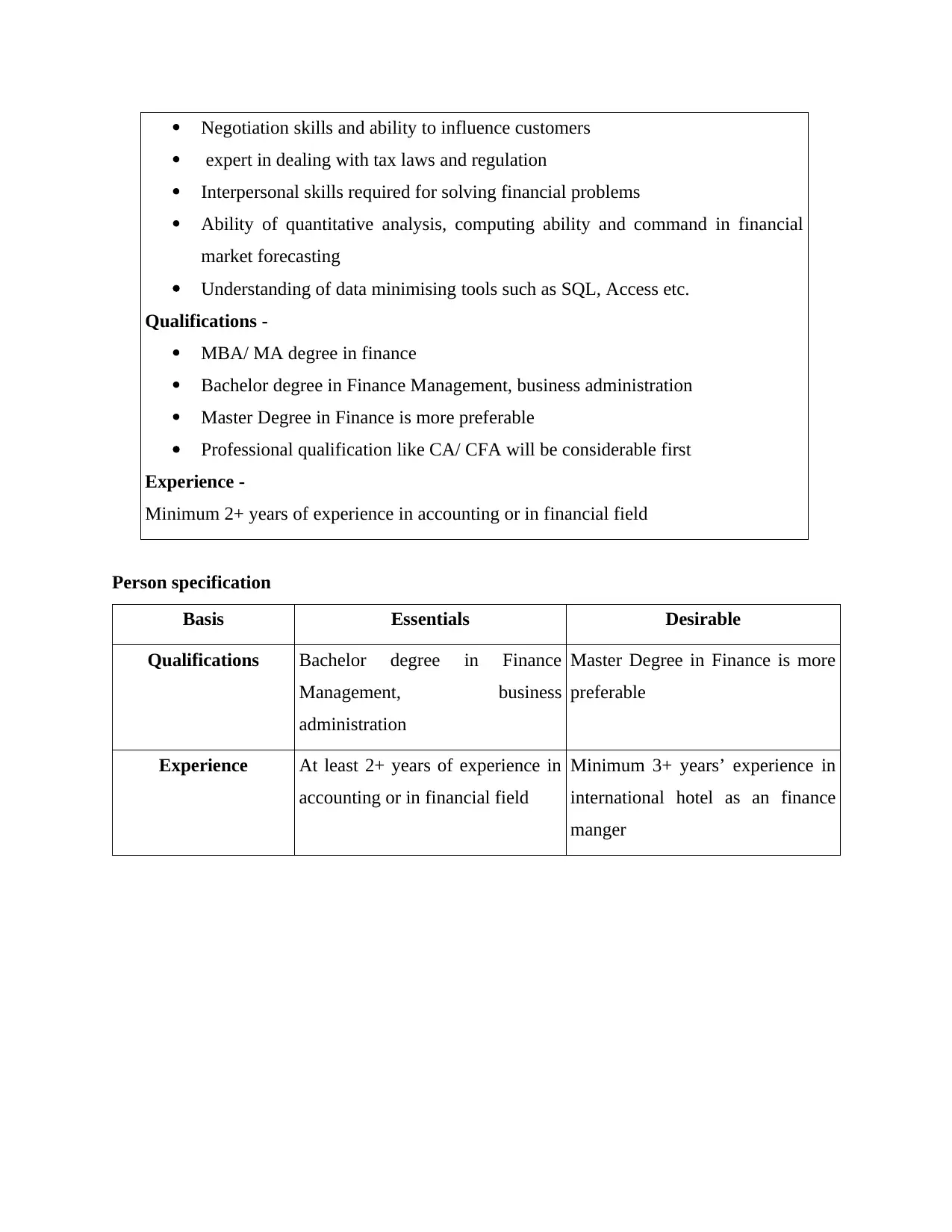
Negotiation skills and ability to influence customers
expert in dealing with tax laws and regulation
Interpersonal skills required for solving financial problems
Ability of quantitative analysis, computing ability and command in financial
market forecasting
Understanding of data minimising tools such as SQL, Access etc.
Qualifications -
MBA/ MA degree in finance
Bachelor degree in Finance Management, business administration
Master Degree in Finance is more preferable
Professional qualification like CA/ CFA will be considerable first
Experience -
Minimum 2+ years of experience in accounting or in financial field
Person specification
Basis Essentials Desirable
Qualifications Bachelor degree in Finance
Management, business
administration
Master Degree in Finance is more
preferable
Experience At least 2+ years of experience in
accounting or in financial field
Minimum 3+ years’ experience in
international hotel as an finance
manger
expert in dealing with tax laws and regulation
Interpersonal skills required for solving financial problems
Ability of quantitative analysis, computing ability and command in financial
market forecasting
Understanding of data minimising tools such as SQL, Access etc.
Qualifications -
MBA/ MA degree in finance
Bachelor degree in Finance Management, business administration
Master Degree in Finance is more preferable
Professional qualification like CA/ CFA will be considerable first
Experience -
Minimum 2+ years of experience in accounting or in financial field
Person specification
Basis Essentials Desirable
Qualifications Bachelor degree in Finance
Management, business
administration
Master Degree in Finance is more
preferable
Experience At least 2+ years of experience in
accounting or in financial field
Minimum 3+ years’ experience in
international hotel as an finance
manger
⊘ This is a preview!⊘
Do you want full access?
Subscribe today to unlock all pages.

Trusted by 1+ million students worldwide
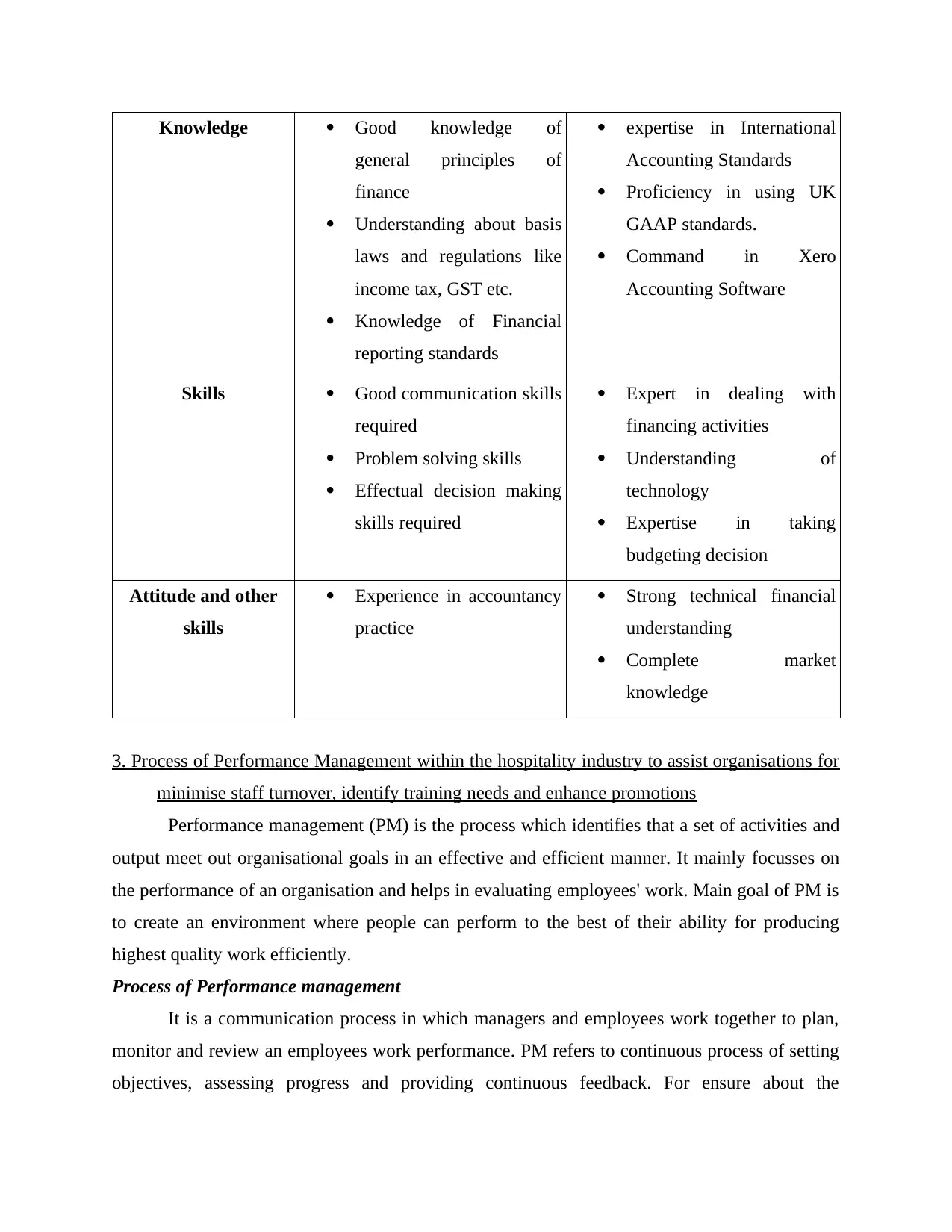
Knowledge Good knowledge of
general principles of
finance
Understanding about basis
laws and regulations like
income tax, GST etc.
Knowledge of Financial
reporting standards
expertise in International
Accounting Standards
Proficiency in using UK
GAAP standards.
Command in Xero
Accounting Software
Skills Good communication skills
required
Problem solving skills
Effectual decision making
skills required
Expert in dealing with
financing activities
Understanding of
technology
Expertise in taking
budgeting decision
Attitude and other
skills
Experience in accountancy
practice
Strong technical financial
understanding
Complete market
knowledge
3. Process of Performance Management within the hospitality industry to assist organisations for
minimise staff turnover, identify training needs and enhance promotions
Performance management (PM) is the process which identifies that a set of activities and
output meet out organisational goals in an effective and efficient manner. It mainly focusses on
the performance of an organisation and helps in evaluating employees' work. Main goal of PM is
to create an environment where people can perform to the best of their ability for producing
highest quality work efficiently.
Process of Performance management
It is a communication process in which managers and employees work together to plan,
monitor and review an employees work performance. PM refers to continuous process of setting
objectives, assessing progress and providing continuous feedback. For ensure about the
general principles of
finance
Understanding about basis
laws and regulations like
income tax, GST etc.
Knowledge of Financial
reporting standards
expertise in International
Accounting Standards
Proficiency in using UK
GAAP standards.
Command in Xero
Accounting Software
Skills Good communication skills
required
Problem solving skills
Effectual decision making
skills required
Expert in dealing with
financing activities
Understanding of
technology
Expertise in taking
budgeting decision
Attitude and other
skills
Experience in accountancy
practice
Strong technical financial
understanding
Complete market
knowledge
3. Process of Performance Management within the hospitality industry to assist organisations for
minimise staff turnover, identify training needs and enhance promotions
Performance management (PM) is the process which identifies that a set of activities and
output meet out organisational goals in an effective and efficient manner. It mainly focusses on
the performance of an organisation and helps in evaluating employees' work. Main goal of PM is
to create an environment where people can perform to the best of their ability for producing
highest quality work efficiently.
Process of Performance management
It is a communication process in which managers and employees work together to plan,
monitor and review an employees work performance. PM refers to continuous process of setting
objectives, assessing progress and providing continuous feedback. For ensure about the
Paraphrase This Document
Need a fresh take? Get an instant paraphrase of this document with our AI Paraphraser
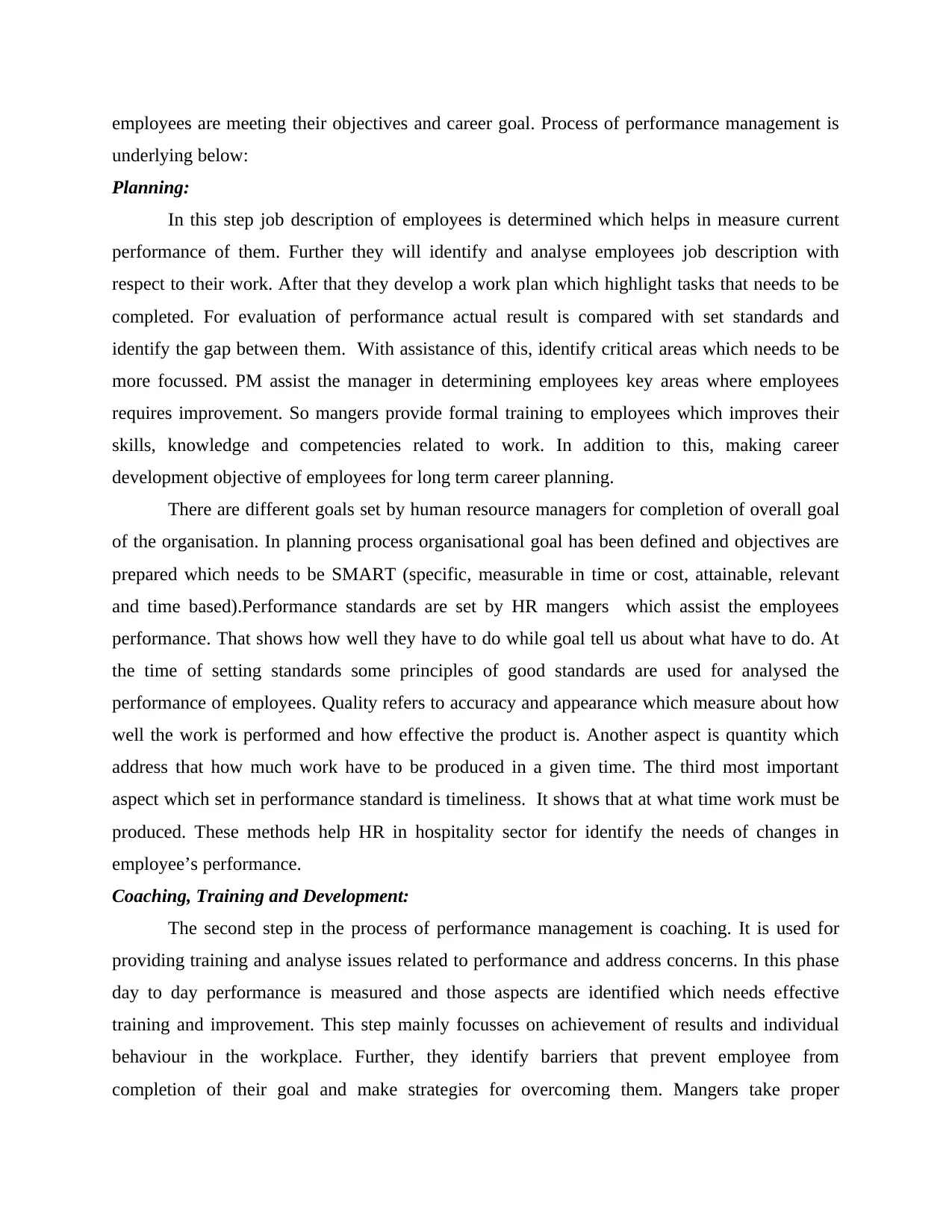
employees are meeting their objectives and career goal. Process of performance management is
underlying below:
Planning:
In this step job description of employees is determined which helps in measure current
performance of them. Further they will identify and analyse employees job description with
respect to their work. After that they develop a work plan which highlight tasks that needs to be
completed. For evaluation of performance actual result is compared with set standards and
identify the gap between them. With assistance of this, identify critical areas which needs to be
more focussed. PM assist the manager in determining employees key areas where employees
requires improvement. So mangers provide formal training to employees which improves their
skills, knowledge and competencies related to work. In addition to this, making career
development objective of employees for long term career planning.
There are different goals set by human resource managers for completion of overall goal
of the organisation. In planning process organisational goal has been defined and objectives are
prepared which needs to be SMART (specific, measurable in time or cost, attainable, relevant
and time based).Performance standards are set by HR mangers which assist the employees
performance. That shows how well they have to do while goal tell us about what have to do. At
the time of setting standards some principles of good standards are used for analysed the
performance of employees. Quality refers to accuracy and appearance which measure about how
well the work is performed and how effective the product is. Another aspect is quantity which
address that how much work have to be produced in a given time. The third most important
aspect which set in performance standard is timeliness. It shows that at what time work must be
produced. These methods help HR in hospitality sector for identify the needs of changes in
employee’s performance.
Coaching, Training and Development:
The second step in the process of performance management is coaching. It is used for
providing training and analyse issues related to performance and address concerns. In this phase
day to day performance is measured and those aspects are identified which needs effective
training and improvement. This step mainly focusses on achievement of results and individual
behaviour in the workplace. Further, they identify barriers that prevent employee from
completion of their goal and make strategies for overcoming them. Mangers take proper
underlying below:
Planning:
In this step job description of employees is determined which helps in measure current
performance of them. Further they will identify and analyse employees job description with
respect to their work. After that they develop a work plan which highlight tasks that needs to be
completed. For evaluation of performance actual result is compared with set standards and
identify the gap between them. With assistance of this, identify critical areas which needs to be
more focussed. PM assist the manager in determining employees key areas where employees
requires improvement. So mangers provide formal training to employees which improves their
skills, knowledge and competencies related to work. In addition to this, making career
development objective of employees for long term career planning.
There are different goals set by human resource managers for completion of overall goal
of the organisation. In planning process organisational goal has been defined and objectives are
prepared which needs to be SMART (specific, measurable in time or cost, attainable, relevant
and time based).Performance standards are set by HR mangers which assist the employees
performance. That shows how well they have to do while goal tell us about what have to do. At
the time of setting standards some principles of good standards are used for analysed the
performance of employees. Quality refers to accuracy and appearance which measure about how
well the work is performed and how effective the product is. Another aspect is quantity which
address that how much work have to be produced in a given time. The third most important
aspect which set in performance standard is timeliness. It shows that at what time work must be
produced. These methods help HR in hospitality sector for identify the needs of changes in
employee’s performance.
Coaching, Training and Development:
The second step in the process of performance management is coaching. It is used for
providing training and analyse issues related to performance and address concerns. In this phase
day to day performance is measured and those aspects are identified which needs effective
training and improvement. This step mainly focusses on achievement of results and individual
behaviour in the workplace. Further, they identify barriers that prevent employee from
completion of their goal and make strategies for overcoming them. Mangers take proper
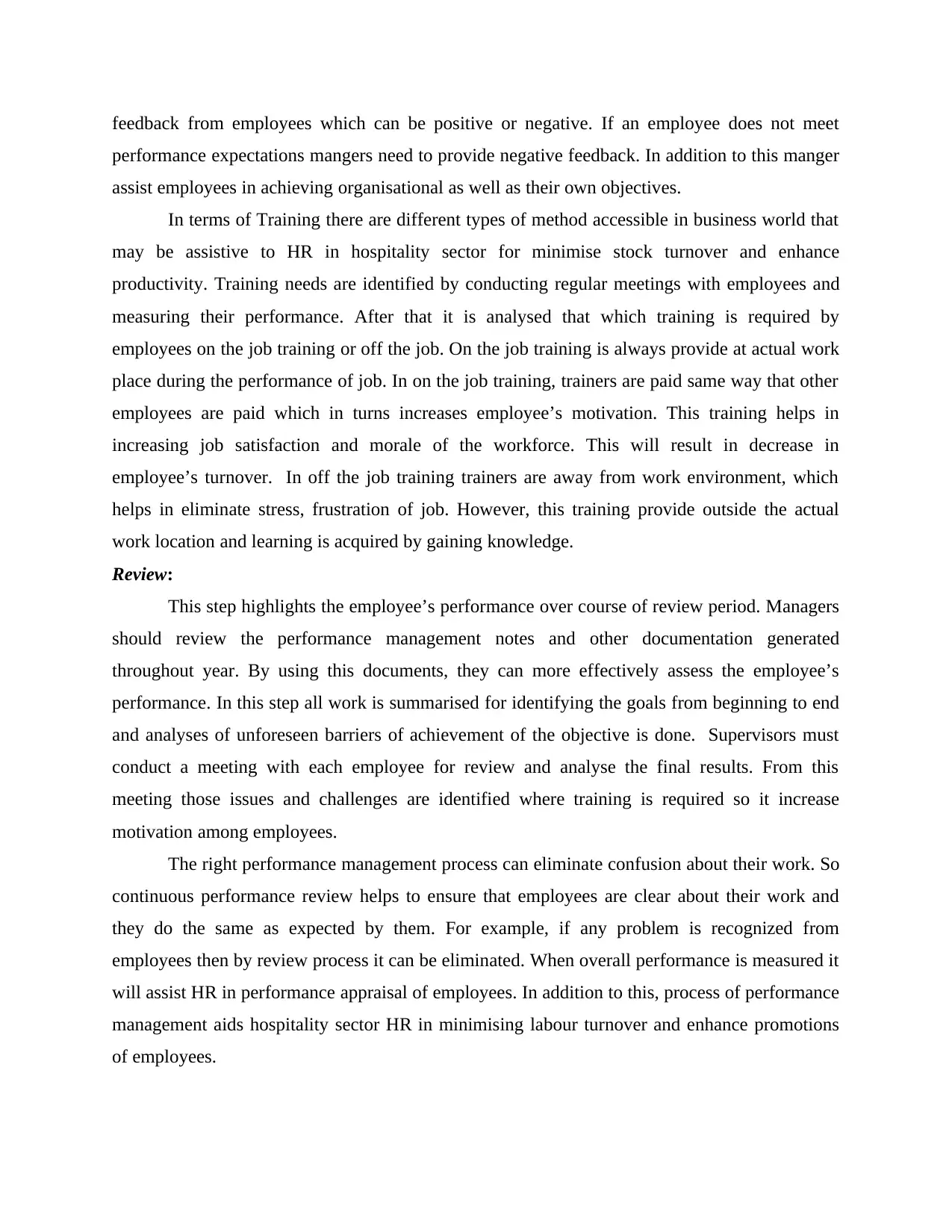
feedback from employees which can be positive or negative. If an employee does not meet
performance expectations mangers need to provide negative feedback. In addition to this manger
assist employees in achieving organisational as well as their own objectives.
In terms of Training there are different types of method accessible in business world that
may be assistive to HR in hospitality sector for minimise stock turnover and enhance
productivity. Training needs are identified by conducting regular meetings with employees and
measuring their performance. After that it is analysed that which training is required by
employees on the job training or off the job. On the job training is always provide at actual work
place during the performance of job. In on the job training, trainers are paid same way that other
employees are paid which in turns increases employee’s motivation. This training helps in
increasing job satisfaction and morale of the workforce. This will result in decrease in
employee’s turnover. In off the job training trainers are away from work environment, which
helps in eliminate stress, frustration of job. However, this training provide outside the actual
work location and learning is acquired by gaining knowledge.
Review:
This step highlights the employee’s performance over course of review period. Managers
should review the performance management notes and other documentation generated
throughout year. By using this documents, they can more effectively assess the employee’s
performance. In this step all work is summarised for identifying the goals from beginning to end
and analyses of unforeseen barriers of achievement of the objective is done. Supervisors must
conduct a meeting with each employee for review and analyse the final results. From this
meeting those issues and challenges are identified where training is required so it increase
motivation among employees.
The right performance management process can eliminate confusion about their work. So
continuous performance review helps to ensure that employees are clear about their work and
they do the same as expected by them. For example, if any problem is recognized from
employees then by review process it can be eliminated. When overall performance is measured it
will assist HR in performance appraisal of employees. In addition to this, process of performance
management aids hospitality sector HR in minimising labour turnover and enhance promotions
of employees.
performance expectations mangers need to provide negative feedback. In addition to this manger
assist employees in achieving organisational as well as their own objectives.
In terms of Training there are different types of method accessible in business world that
may be assistive to HR in hospitality sector for minimise stock turnover and enhance
productivity. Training needs are identified by conducting regular meetings with employees and
measuring their performance. After that it is analysed that which training is required by
employees on the job training or off the job. On the job training is always provide at actual work
place during the performance of job. In on the job training, trainers are paid same way that other
employees are paid which in turns increases employee’s motivation. This training helps in
increasing job satisfaction and morale of the workforce. This will result in decrease in
employee’s turnover. In off the job training trainers are away from work environment, which
helps in eliminate stress, frustration of job. However, this training provide outside the actual
work location and learning is acquired by gaining knowledge.
Review:
This step highlights the employee’s performance over course of review period. Managers
should review the performance management notes and other documentation generated
throughout year. By using this documents, they can more effectively assess the employee’s
performance. In this step all work is summarised for identifying the goals from beginning to end
and analyses of unforeseen barriers of achievement of the objective is done. Supervisors must
conduct a meeting with each employee for review and analyse the final results. From this
meeting those issues and challenges are identified where training is required so it increase
motivation among employees.
The right performance management process can eliminate confusion about their work. So
continuous performance review helps to ensure that employees are clear about their work and
they do the same as expected by them. For example, if any problem is recognized from
employees then by review process it can be eliminated. When overall performance is measured it
will assist HR in performance appraisal of employees. In addition to this, process of performance
management aids hospitality sector HR in minimising labour turnover and enhance promotions
of employees.
⊘ This is a preview!⊘
Do you want full access?
Subscribe today to unlock all pages.

Trusted by 1+ million students worldwide
1 out of 18
Related Documents
Your All-in-One AI-Powered Toolkit for Academic Success.
+13062052269
info@desklib.com
Available 24*7 on WhatsApp / Email
![[object Object]](/_next/static/media/star-bottom.7253800d.svg)
Unlock your academic potential
Copyright © 2020–2026 A2Z Services. All Rights Reserved. Developed and managed by ZUCOL.



